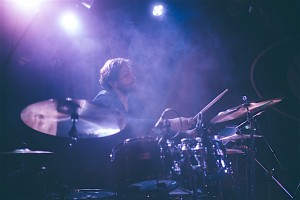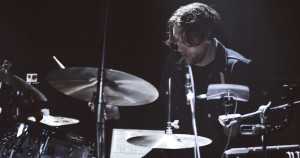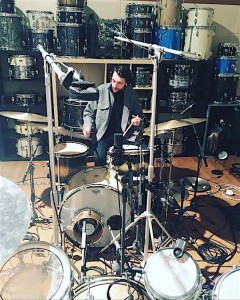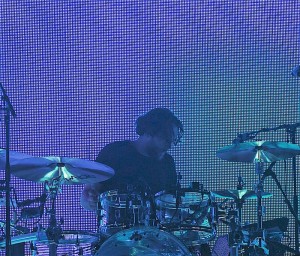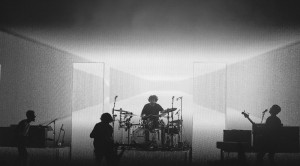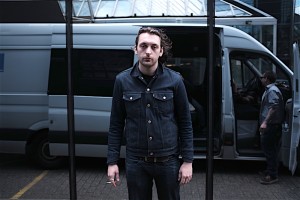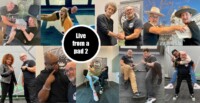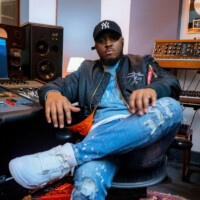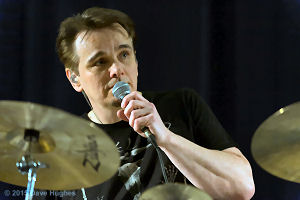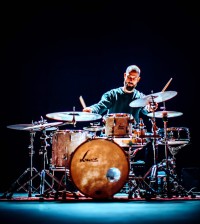Even at just the age of 23, Freddy Sheed’s CV already holds names like The 1975, Leona Lewis, Busted, Take That, John Newman and many more.
Currently on the road with Lily Allen and long-term gig The Japanese House, Freddy not only swings the sticks but also works as a musical director for various acts. On top of all of this, he is about to open his own recording studio and record label in Stratford.
I caught up with Freddy to chat about his upbringing, his love for vintage drums, his work on and off the drum chair and much more.
First things first: Why drums?
My dad is very musical – he’s a great pianist – so I think music was kind of a universal thing in our house. My mum is an amazing chef and had a lot of pots and pans lying around the house and after I’d gone through 4 or 5 of my mother’s favourite wooden spoons, she was like “Ok, we’ve got to get him a kit”. It all kind of started from there to be honest. I liked it because it was so instant. That’s the best thing about playing drums: you deliver a note and you immediately get a sonic return. Very therapeutic for a child with ADHD like me.
Did you have drum lessons in school then?
Not really, I just listened to a lot of records. My next door neighbour was a drummer so he would occasionally show me a few beats but I didn’t really start studying drums properly till I was 18, when I was fortunate enough to study with the late Bob Armstrong (RIP). Up until then, though, I really didn’t study formally. I’ve always come from the school of wanting to play along to records. Obviously being of the YouTube generation I got a lot of my vocabulary from watching videos online, but I was always more interested in watching clips of drummers play on gigs. I never had much interest in those ‘Gospel flops’ tutorial clips – way too hard! So yeah, when I was 18 I did a pretty intense bit of work with Bob who sorted my technique out for life.
And then straight into music after school?
Yes, I finished school at 17 and I still haven’t checked my A-level results – that’s probably the most rock and roll thing I can say about my school education! In fact, there was an annual music show at school which was a huge part of my learning. Once a year we would get together and play through songs and it got taken pretty seriously. One of the student’s fathers was a successful musician and he would send his touring crew down to assist us in putting the show together. I developed a lot of my approach to music by spending time with the professional audio engineers through that opportunity. I learnt a lot from them about sound-checking and how important respect is, especially towards the the people who work with musicians to make a show come together. Also I got the opportunity to get involved with a bit of musical direction there which is something I’m doing professionally now. But yeah, I didn’t really care about my history lessons, it was all about music for me.
So although you hadn’t quite approached a ‘typical’ learning curve into drumming the decision was made that it should be a career in music?
Absolutely – and of course being a hormonal teenager and realising playing drums is really cool. That was a big factor.
What was your first step into the industry then?
I got offered my first tour with a singer called Gabriel Bruce, who was a couple of years above me at school. From there, just through playing and meeting people in those clubs, I connected with a producer by the name of Ash Howes who put me in for a few sessions. We did quite a bit together, including a Leona Lewis record.
Obviously moving up to London from the South Coast a few years later helped as well – London’s an incredible place to be a musician and being there permanently really helped with my visibility as a player. But ultimately, I owe a lot to Gabriel who gave me a shot.
You went on to do quite a bit of work with Ash Howes, right?
Yes, he would just call me whenever he needed live drums – he gave me a nice break. We’ve worked together on a bunch of stuff now and it’s really nice. I think that’s the thing with doing this type of work: it’s a relationship-based industry. I really feel like once you find the people you want to work with, you just want to work with your mates. Playing and being at the right level is important but once you’ve got good time as a drummer, it’s kind of subjective. All of my peers are amazing so it comes down to personal taste. Ash and I just got on; that’s kind of how the gigs I’ve done have come about, from getting on with people on a personal level.
I’ve actually just done a session again with Ash for Stella Parton which was brilliant – she’s Dolly Parton’s sister. That session turned out really well. We recorded that at a lovely spot in Brixton. I’m a real vintage drum nut so I got to take down my Radiokings, my 400 and my 1920s Ludwig and Ludwig Pioneer snare – all of the good stuff basically.
Vintage drum nut? Tell me more.
Yeah, it was only going to be five minutes before we started talking about vintage drums! I’m pretty obsessed. I love owning old things. My only complaint is that when you do a session or a gig, all the serial numbers of the gear should be on an inventory so you could track the history of where the drum has been. I’m looking over at a stack of snares right now; I have a 1940s Radioking and I would just love to know where that drum has been before. I love it.
I also think If someone was to put me in front of some microphones and say “3,2,1,do something brilliant!” I’d really struggle with that… The best ideas come from working within some limitations or restrictions. Vintage gear immediately makes you play differently, because you have to fight against its inherent or inherited flaws. It reacts in a completely different manner to a modern drum kit. That comes from the feel – the heads, ported or unported kick drums or the fact that you may find your bass drum at the other end of the room by the time you’ve finished the song. All of these factors influence your musical performance.
Do you have your own studio for all your treasures or more of a vault?
I’m actually just about to open my own studio in Stratford. What’s fantastic is that I’m working with another four guys all with their own skills and things they can bring to the table. There’s a fantastic composer, an engineer, a singer/songwriter and a really good friend of mine, Simon Francis, a phenomenal musician and bassist for Ellie Goulding, so we’ve kind of got an in-house band ready to go. It’s really exciting. We’re opening up a studio and a record label in September.
When that happens, I won’t have to keep storing all my stuff in lockups all over town. Drums are so cumbersome, I should have taken up the flute instead.
It’s a risk with the studio but I feel like now is the time to do it. I get a lot of work for touring, I’ve been very fortunate and I’m not knocking the fact I had a very busy few years for one second but I really love the studio. If I could choose I’d probably… I mean the grass is always greener of course, but I’d prefer to be a studio guy right now or get a healthier balance between the two. I think if opportunity doesn’t knock you have to build the door (or a studio in this case) yourself. We just took a plunge on that place and it’s turning out to be really rewarding. Even choosing the floor, building the storage in and finding the right space. It’s a nice breath of fresh air jumping into things that make you feel slightly out of your depth. I think that’s how you grow. I’m not saying I’m some sort of Yoda-like drum Sensei – I’m 23, I’m definitely not that – but I’ve had the fortune of playing drums full-time over the past few years. I’ve still got a lot to work on but I’d like something fresh to sink my teeth into.
Are we facing a possible future (additional) addiction to buying vintage microphones and pre-amps then?
Don’t even start, I’m terrified. I’m sure you know Ralph Salmins, he’s kind of been a mentor to me in many ways. I studied a little bit with him and we hung out a lot. [Author’s note: drummer Ralph Salmins’ studio, The Bunker, is full of vintage recording gear]. His mic collection is amazing. It’s a slippery slope. I think I’ll have to work on being a bit of a monk initially or it will be baked beans on toast for a while – and no girlfriend…
You’ve mentioned The Japanese House already. Are you still working with them a lot?
I am indeed – in fact, I’m off to America with them tomorrow. It’s calming down a little bit at the moment because Amber is writing an album but it has kept me very busy over the last 2.5 years. She’s been great and has given me a lot of opportunities to travel the world and also be very creative. She really lets me do my own thing. I also work as the musical director for the band so I get to dig into quite a few roles on that gig which is really rewarding.
It’s quite an electronic heavy gig even from a drumming point of view, right?
It is, yes. It’s really about getting a good blend which is pretty difficult. I work very closely with the front of house engineer, Ross McGroggan. If I had to work with one person for the rest of my life, it would be him. We have a really nice approach with working together and I think the combination of knowing what comes out to the audience vs. what happens on stage really helps us dial in that blend of synthetic and acoustic. He’s hugely responsible for the drum sound on our gigs, harnessing the tracks and that sort of thing.
You’ve done some work with The 1975. Interesting story how that came about…
That was really peculiar, yeah. I was out on tour with The Japanese House and maybe a week before I helped out with The 1975, I covered Wolf Alice (who were on the tour as well) because their drummer had some passport issues.
A week later George [Daniel, original drummer for The 1975] broke his collarbone at about one in the morning. I guess the idea of me being a successful dep was still fresh from the week before, so Adam the guitarist knocked on the door of our bus and asked me how I’d feel about filling in. I was told they’d cancel tomorrow’s gig and use it as a rehearsal day. I went to bed thinking it would be fine and had a leisurely lie-in the next day, only to wake up and find the crew loading the video towers/stage production in (we were in Tulsa) It was then the moment dawned on me that they couldn’t cancel the show and I would just have to get it done. So yeah, I had about 10 hours to put the gig together – but we made it happen and it turned out to be a great gig. I had a complete blast on that show. Although they let me do my own thing, I worked really hard on sounding like George, which was a treat. I absolutely love those boys – they’re friends for life. They really looked out for me. I remember we did their big show of the tour at the Barclays Center in New York and they flew my girlfriend out as a little ‘thank you’ for stepping in. After 6/7 weeks of being away on tour that was a really big moment for me. Nothing but respect for those guys.
You’ve just come out of rehearsals with Lily Allen this week?
Oh yeah, I’ve done a few bits with her which is really exciting. I love her tunes and grew up listening to her stuff. That’s been really fun. We just did a show in the very luxurious St. Tropez last week. The gig came in for me from the fantastic music director Jamie Norton, who’s been a real treat and has given me a lot of great opportunities. I’ve been really fortunate to work with him on a few gigs now. The rehearsals have been really refreshing. Jamie’s approach is a very detailed, tooth-comb like investigation into the arrangements, working on guitar sound by guitar sound and developing all the drum sounds so it’s really immaculate and spot-on. A lot of work was required but I was very happy with the end product of that show. He’s got great ears and a similar taste in luggage and coffee to me, so we get on.
You have some big pop names on your CV: Take That, Busted…
Both of those opportunities were also overseen by Jamie Norton. It’s also worth mentioning that a huge part of my career and assistance has been thanks to Mr. Bob Knight who introduced me to Jamie in the first place. Bob always looks out for me and put me in with Busted (I did a few things with those guys) and Jamie and I have been friends ever since. Same with Bob – we’ve hung out first and foremost as mates and drum geeks instead of the work thing. Those guys have been huge parts of my career. As I said before, It’s a relationship-based industry and you just want to work with your mates really. The question you should ask yourself is “can I be myself around that person?”- Thats the most important thing.
You’ve mentioned already that you’re getting more and more into the MDing side of things. Has there just always been curiosity about the whole process?
Yes, I’ve always been interested in the bigger picture. As I said, I grew up listening to songs and playing along to records, so it’s always been about facilitating the whole song. For me, the job of musical director is being that bridge between the artist’s idea of the record and the live interpretation of – which is effectively reworking songs whilst paying the best respect to the music. That’s always been of a huge interest to me. Also the Ableton, playback and programming side has just always fascinated me. But yeah, it’s more just having a part in the wider perspective of things and it’s very satisfying having the feeling that you’ve played a part in putting a show together.
Have you ever experienced any barriers seeing as we’re coming from a drumming perspective and now you have to deal with chords and stuff like that?
Absolutely! I still have barriers today. Although I think the best solution to getting past those things is being in situations where you have a deadline and have to get it done. I think that’s always been how I work. You can sit down and say “ok, I’m gonna shed a lot of bass this month” (which is actually something I’m trying to do), however to me, if I get a job through where I have to be working closely with a bassist or playing bass on something, that would provide far more incentive for me to get up and start practicing. You react to your situation.
All of those hurdles – which I did have quite a lot of, especially being a drummer first and not having to deal with harmony – through doing it and having the right incentive, that kind of assisted me. I just had to get on with it and start learning.
Completely unrelated: Juggling.
Juggling. How did you find out about that?! I can never escape! Great with dressing room fruit though, it’s a good party trick.
I got told I was dyspraxic when I was really young and in this stubborn way I kind of just wanted to prove everyone wrong, so I took up juggling. I ended up getting a bit carried away to the point where I entered a few competitions in America. It was from the age of 10 to maybe 13 or 14. I took a little break from playing drums but then realised I could get way more girls if I played drums instead.
It might have even helped you training your coordination for drumming.
Absolutely, it was very good for me physically and socially. I was a bit of a weird kid too so I made a pretty strong group of friends who I’m still in touch with, especially in the states. My dear friend Casey who I used to hang out with back then came to a gig I did recently with The 1975 in America, which was great. It was an interesting phase in my life which never seems to escape me. Even to the point where I’ve walked into sessions with brand new people and they’ve brought it up.
Finally, what’s next?
What’s next? Uh, that’s a very good question. A lot of studio bits and hopefully some home time. I’ve been hanging out with this phenomenal singer called Eva Stone who I’ve met through some of the musicians of The 1975 and we’ve been talking about making some music together for a while. We put little gig together in Newcastle, showcasing some of the other guys’ solo material and just sort of hit it off. She’s moving down to London in a few months and I really wanna work with her. Apart from that I just want to focus on the new studio much more and also just practice again. I really wanna get on that. Especially playing more bass and that sort of thing. So yeah, just learning and trying to do new things.
Thanks a lot for your time Freddy!
On the last US tour, Freddy worked with film maestro Ben Campbell on a drum video. We are very lucky here at mikedolbear.com to be the first to put it out there. Enjoy!
Interview by Tobias Miorin
September 2017

